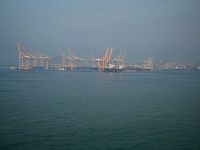Amidst huge volatility, all the regional markets declined significantly in Sep-<?xml:namespace prefix = st1 ns = "urn:schemas-microsoft-com:office:smarttags" />08. In fact decline in all the markets were in double digits except Bahrain which declined by 8.2% during the month. Decline in the markets was led by Saudi Arabia which registered a decline of 14.8% during the month. This was followed by Qatar market which witnessed a decline of 12.2%. After the fall during the month, all the markets in the region have slipped to red YTD with the sole exception of Qatar. Despite the significant decline during the month, Qatar market has a net gain of 7.9% YTD.
Markets across the globe have fallen in Sep-2008 and GCC markets have also not been able to escape this adverse global market impact. Foreign investors have been exiting emerging markets on account of liquidity crunch and losses in the global equity markets and GCC markets are no exception to that. The crisis has severely impacted liquidity in the system and has resulted in huge selling pressures. However we believe the macroeconomic fundamentals of the region is still very much intact and we expect GCC to be among the few regions in the world to escape the impact of global slowdown. It is very difficult to determine the direction of the market during these “unprecedented circumstances”.
The situation has not changed much after Eid Holidays as in first few days of October (just as we were publishing this report) the market were still under a major bout of selling pressure.
|
Table 1 : Index Performances | |||||
|
Country |
Measured by |
|
Index Close |
MTD Growth (%) |
YTD Growth (%) |
|
Bahrain |
Global Bahraini Stocks Index |
<?xml:namespace prefix = v ns = "urn:schemas-microsoft-com:vml" /> |
193.9 |
-8.2 |
-9.4 |
|
Kuwait |
Global General Index |
|
331.6 |
-10.3 |
-12.2 |
|
Oman |
MSM Index |
|
8,493.6 |
-10.5 |
-6.0 |
|
Qatar |
Global DSM Index |
|
737.9 |
-12.2 |
7.9 |
|
Saudi Arabia |
Tadawul All Share Index |
|
7,458.5 |
-14.8 |
-32.4 |
|
UAE |
NBAD Index |
|
10,892.7 |
-12.0 |
-20.7 |
Source: Respective Stock Exchanges and Global Research
Market declines provide buying opportunity….
Regional stock markets have declined over the past few months after gaining during the first part of 2008. In fact most of the markets have reached the lowest level of the year during September 2008. The rally in the first part of the year was driven by conducive macroeconomic environment and improving corporate profitability. While these fundamental growth factors remain intact, a multitude of negative sentiments has driven the market down.
Table 2: Regional Market Performance -YTD
|
Sectors |
Oman |
Saudi Arabia |
Kuwait |
Abu Dhabi |
Dubai |
Qatar |
Bahrain |
|
Banking |
-11.7%* |
-36.4% |
-10.1% |
-12.9% |
-26.1% |
-1.5% |
-2.2% |
|
Investment |
|
-52.6% |
-11.8% |
|
-22.9% |
|
-15.6% |
|
Insurance |
|
-58.9% |
2.6% |
20.6% |
-5.8% |
3.9% |
1.5% |
|
Real Estate |
|
-32.4% |
5.0% |
-29.8% |
-42.3% |
|
|
|
Industrial |
7.0% |
-7.9% |
-18.0% |
-2.6% |
|
2.9% |
-4.3% |
|
Services |
12.8% |
|
-19.8% |
|
|
25.0% |
-10.1% |
|
Food |
|
-23.4% |
-25.4% |
|
|
|
|
|
Hotel & Tourism |
|
-14.9% |
|
|
|
|
24.2% |
|
Consumer/retail |
|
-26.2% |
|
3.7% |
-52.9% |
|
|
|
Materials |
|
|
|
|
-0.7% |
|
|
|
Energy/Utilities |
|
-30.2% |
|
-31.9% |
-49.5% |
|
|
|
Telecom |
|
-34.2% |
|
-12.8% |
-34.9% |
|
|
|
Transport |
|
-27.0% |
|
|
-26.9% |
|
|
|
Healthcare |
|
|
|
0.7% |
|
|
|
|
Petrochemical |
|
-29.6% |
|
|
|
|
|
|
Cement |
|
-35.9% |
|
|
|
|
|
|
Construction |
|
-2.2% |
|
16.5% |
|
|
|
|
Media |
|
-45.5% |
|
|
|
|
|
*Banking and Investment. The figures are at the end of Sep 2008
Source: Respective Stock Exchanges, Global Research
The regional stock markets have declined during the past few months which are mainly on account of negative sentiments and also taking cues from global markets. The global markets, which started to decline in the wake of sub-prime meltdown, are still witnessing declines amongst the slowdown in US and Euro Zone. Though US has posted good economic performance in the second quarter of 2008, still that has not boosted investors’ confidence. We believe that the developed markets have not yet bottomed out. Capital markets in the emerging giants like China and India have also declined mirroring the performance in developed world.
Table 3: Performance of Global Indices
As on 22nd Sep 2008, Source: Bloomberg
The decline in the markets has also been triggered by the outflow of foreign investments. Foreign investors have been exiting emerging markets (GCC markets being no exception) on account of liquidity crunch and losses in the global equity markets. The selling pressure by foreign investors has accentuated over the past few days in the wake of recent crisis of Lehman Brothers, Merrill Lynch, AIG, Wachovia etc. There have been concerns about the Dubai real estate market amidst expectations of over supply in coming years and slowdown in real estate activity. With the strengthening of US Dollar against major currencies, the chances of revaluation/de-pegging of UAE Dirham has come down and that has led to outflow of speculative money invested in Dirham – denominated investments. These developments in neighboring markets have adversely impacted risk appetite of investors in GCC stock markets. The GCC stock markets are positively correlated to each other.
The recent fall in oil prices is another important factor which has contributed to negative sentiments prevailing in the market. Oil prices reached its all time high level in the first half of July 2008. However since then it has declined by more than 25% due to factors like weakened demand, stronger US Dollar and improved geo-political situation.
We believe that the US$700bn financial-market rescue plan by US lawmakers will bring relief to market and will help restore the confidence of the investors in financial markets. Though the rescue plan will not solve all the problems faced by financial markets, it will definitely help in controlling the panic created in the market after the turmoil witnessed by many leading financial institutions. We share the belief that ‘a flawed plan’ is definitely better than ‘no plan’. We also share the belief that this is not a bailout for Wall Street only but this is about the helping the common people on the street also. The plan was required to control the spread of economic turmoil sparked by sub-prime crisis. It is really important to infuse liquidity into the financial system at this critical juncture. This step was critical to prevent the US falling into another “Great Depression’’. The bailout is the first step toward restoring confidence, however still a lot of work needs to done in order to get the financial system out of this mess created by huge burden of bad debts. We expect similar support to be provided other governments such as in Europe to bring relief to their respective capital markets.
The overall corporate earnings of GCC corporates have improved during first half of 2008. We believe the macroeconomic factors remain strong which will help the corporate sector going forward. Growth is also being driven by the ongoing Government expenditure as well as higher private investments on the back of rising confidence in future economic prospects. With regional Governments further reaffirming its commitment on economic diversification, we expect this to result in more secular and sustainable economic growth. We believe the growth of core earning stream of the corporates will remain intact even though other income sources of companies (mainly which are dependent on capital market performance) might be hit due recent declines in stock markets.
The prospect of good growth in 2008 combined with stock market reverses in the last few days has made the valuation of stocks attractive. At the current prices (as on 7th October), the GCC markets are trading at a multiple of 10-11 based on earnings of trailing twelve months. Based on fundamental assumptions, we believe t







